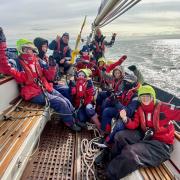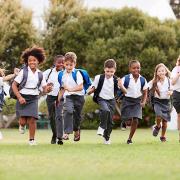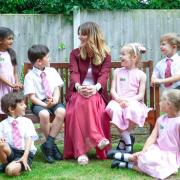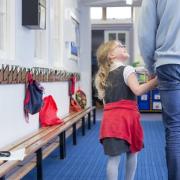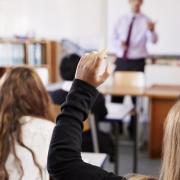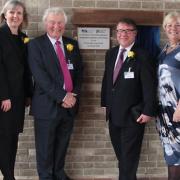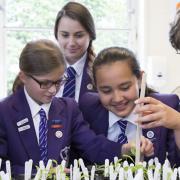Throughout adolescence peer relationships at school change massively and are an enormous part of a child’s identity, particularly for girls. We’ve spoken to Thorpe Hall in Southend-on-Sea about their ‘Girls on Board’ approach, a revolutionary way to support girls at school

“For children at school it’s almost an existential imperative to have a friend,” says Andrew Hampton, Headteacher of Thorpe Hall School on Southend-on-Sea’s Wakering Road. “Without that reference or acknowledgement within your peers it’s easy for pupils to feel like they have disappeared completely.”
Even though the trials and tribulations of school life may seem trivial as many of us look back on our time in the playground and classroom, to pupils experiencing them right now they can be incredibly impactful on their personal life and their academic performance.
To help pupils at this non-selective, co-educational independent school nurture their friendships, navigate conflict and stay focussed on their studies, Hampton has developed ‘Girls on Board’ and ‘Working with Boys’, two approaches that support pupils in working out their complex personal relationships.
What is ‘Girls on Board’ all about?
When attempting to solve conflict between pupils a teacher would traditionally take a “justice-style” approach by individually speaking to those involved and finding out who has potentially been at fault.

‘Girls on Board’ - which is partly based upon parenting guide ‘Queen Bees and Wannabes’, the inspiration for teen angst movie ‘Mean Girls’ - takes a very different approach and doesn’t assume that somebody has done something wrong.
“We call all the girls together involved to go through a very objective and non-judgmental set of exercises which is designed to raise empathy among those girls,” says Hampton.
The girls involved will run through a number of different social scenarios and will actively contribute how they feel throughout the process, helping them all to understand that each has their own anxieties about their friendships which are often more alike than they might think.
Hampton says: “‘Girls on Board’ is rooted in the acknowledgment of the truth that every girl needs a friend, particularly girls aged between 8-18. When you start to put that truth at the heart of supporting all girls and their friendships, things fundamentally change.”

Hampton has also developed ‘Working with Boys’ for male pupils which similarly focuses on developing emotional literacy but differs by acknowledging the challenges more often experienced by boys including anger and lack of motivation.
“On the whole for boys there isn’t the same complexity of negotiation that needs to go on to apologise or make things right,” says Hampton. “Often boys will fall out, maybe have harsh words with each other, maybe sulk for 12 hours but then it’s forgotten and never talked about again.”
Again the process wants to make boys recognise through social development that they have more similarities than differences when it comes to their feelings and experiences. This aims to make them more empathetic and more likely to help each other.
How do peer relationships change during adolescence?
The process of developing peer relationships really begins at around age five when children first interact with other children without the close mediation of a parent or adult. Hampton says this is a crucial time that “takes the child from being completely tied into the parents through to full adulthood”.

Hampton believes it is around the age of eight that children genuinely begin to feel, understand and experience what others are feeling - the ideal point to begin working on their social development. “It’s at that point that those friendships become harder to manage from an adult’s point of view,” says Hampton.
“As those friendships become core to the identity of that emerging adolescent, meddling in their relationships runs the risk of meddling with their identity. That’s why it’s so important to teach and support pupils in the right way with such immense care.”
Rather than require his teaching staff to strictly adhere to a rigid way of educating, Hampton allows his teachers the freedom and autonomy to deliver the school’s values of compassion, participation, engagement and mutual respect.
With pupils buying into those values, it provides the perfect environment where there can be a genuinely open dialogue discussing emotional literacy.
Hampton says: “We are very happy to let teachers work to their own strengths and focus on the idea of engagement and participation with the outcome of good, sustainable learning at the end of it. How they get to that point is up to them and that allows each teacher to work to the very best of what they can do.”
This innovative educational approach - along with the success of ‘Girls on Board’ which is now being used at over 80 schools in the UK - has seen Thorpe Hall nominated for a number of awards, including The Wellbeing Initiative of the Year from Tes. The school also has its highest ever number of pupils since it first opened in 1925.
Keep an eye out for the ‘Girls on Board’ tagline ‘Happier Girls Do Better’ - chances are you’ll be seeing it a lot more.
___________
To find out more about Thorpe Hall School and the ‘Girls on Board’ approach, please visit their website or call them on 01702 582340.




